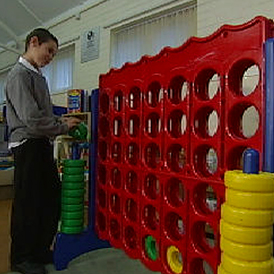Children in need losing out on frontline services
 Jackie Long
Social Affairs Editor and Presenter
Jackie Long
Social Affairs Editor and Presenter
Thousands of vulnerable children and families are being left without access to vital services because of the government cuts, according to one of the country’s biggest children’s charities.
Action for Children surveyed 200 of their frontline projects to assess the impact of the cuts, a year on from the comprehensive spending review, writes Channel 4 News Social Affairs Editor Jackie Long.
It found 68 per cent of frontline children’s services have had their budgets cut, while at the same time almost half say demand for their services has risen sharply.
And it issued this stark warning – that 5,000 children and families in need of help, are not able to get it.
The report will make difficult reading for the prime minister, David Cameron. He made clear from the beginning of his time as Tory leader his belief that a good society always protects the poorest and most vulnerable.

‘This need is not going to go away’
At the Action for Children project in Walton, in north Liverpool, they know only too well, the vulnerable and poor. It is one of the most deprived areas in the country. High unemployment, crime and poor housing are just some of the myriad problems affecting the community.
We worry about what will happen to these children because we know things are not going to get better in the short term. Lesley Stopworth, Action for Children
The project runs a range of early intervention projects dealing with everything from runaways, to parenting problems and courses for children with behavioural problems. Two have had their local authority funding halved, one has had it scrapped altogether.
Lesley Stopworth, the project manager, told Channel 4 News: “We know and we see children that we wish we could provide a service for but we know we can’t do it.
And we worry a great deal about what will happen to these children because we know things are not going to get better in the short term.”
She went on: “This need is not going to go away. It’s there and we’re going to reap the rewards of this.”
How far will it go?
When you look at some of the projects affected by the cuts, it is perhaps easy to see how they are not judged as priority services. But according to Lesley, that would be a mistake.
The mentoring project they run for children running into trouble at home and at school because of bad behaviour is a good example, she says, of critical early intervention.
If they don’t get help when they need it, how far is it going to go? Joanne Connolly, parent
Joanne Connolly, whose son Jaden has been through the programme, agrees. Jaden became withdrawn and aggressive while battling with problems at school. When his parents tried to talk to him, he would lash out. He often ended up lashing out at his sister or trashing his room.
Joanne says without the mentoring programme, she dreads to think where he would have ended up.
“He could have taken it onto the street,” she told Channel 4 News. “As it gets older it can get worse. They can end up as criminals. If they don’t get that help when they need it – how far is it going to go?”
The government too believes that early intervention is crucial. But on the cuts, it said today that it’s up to local authorities to decide how to spend their money.